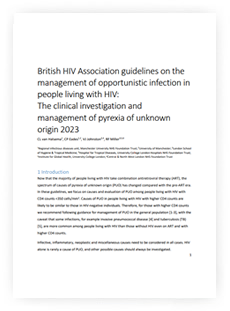The clinical investigation and management of pyrexia of unknown origin 2023
British HIV Association guidelines on the management of opportunistic infection in people living with HIV:
The clinical investigation and management of pyrexia of unknown origin 2023
Now that the majority of people living with HIV take combination antiretroviral therapy (ART), the spectrum of causes of pyrexia of unknown origin (PUO) has changed compared with the pre-ART era. In these guidelines, we focus on causes and evaluation of PUO among people living with HIV with CD4 counts <350 cells/mm3. Causes of PUO in people living with HIV with higher CD4 counts are likely to be similar to those in HIV-negative individuals. Therefore, for those with higher CD4 counts we recommend following guidance for management of PUO in the general population, with the caveat that some infections, for example invasive pneumococcal disease and tuberculosis, are more common among people living with HIV than those without HIV even on ART and with higher CD4 counts.
Infective, inflammatory, neoplastic and miscellaneous causes need to be considered in all cases. HIV alone is rarely a cause of PUO, and other possible causes should always be investigated.
The guidelines are written for HIV clinicians treating people with low CD4 counts as inpatients and outpatients.
Downloads
Additional information
Appendices
General methodology
Supporting people living with HIV and opportunistic infections
Consultation comments
Comments received by the BHIVA Secretariat during the public consultation process
Declaration of interests
Declaration of interests from writing group members
Non-technical summary
Please note: The non-technical summary is less detailed than the full guideline and if you are reading this because it is relevant to your own healthcare, please do discuss any concerns or questions with your healthcare professionals.
Writing group
Dr Clare van Halsema (Chair), Dr Christopher Eades, Dr Victoria Johnston, Prof Robert Miller
UK-CAB (community) members are involved in the writing and/or proofreading of each chapter, and where not listed as authors are the UK-CAB members of the Guidelines Subcommittee.
Peer review
The guidelines were peer reviewed by Dr Ewan Hunter, Newcastle upon Tyne Hospitals NHS Foundation Trust, Dr Mark Melzer, Barts Health NHS Trust, London, and Dr Roshina Gnanadurai, Southmead Hospital, North Bristol NHS Trust.
Guideline updates and date of next review
The guidelines are scheduled for full review by 2028.
Reference
van Halsema CL, Eades CP, Johnston VJ, Miller RF. British HIV Association guidelines on the management of opportunistic infection in people living with HIV: The clinical investigation and management of pyrexia of unknown origin 2023. HIV Med 2023; 24 Suppl 4:3-18.




